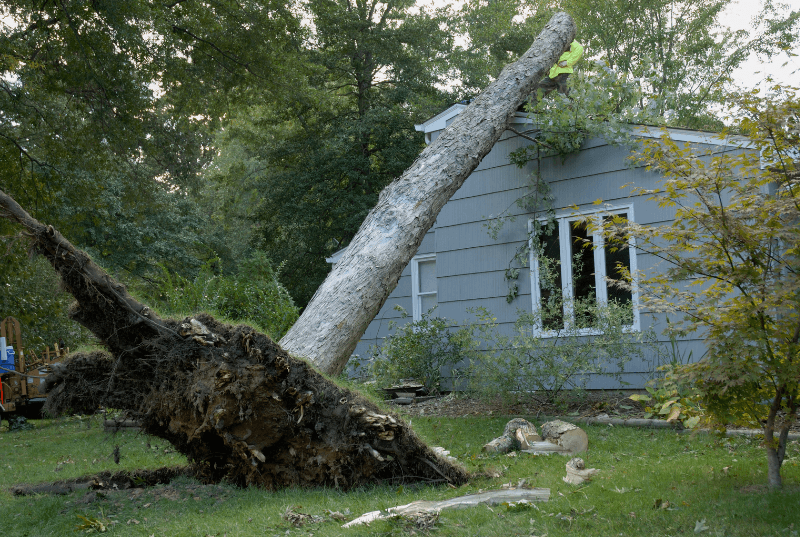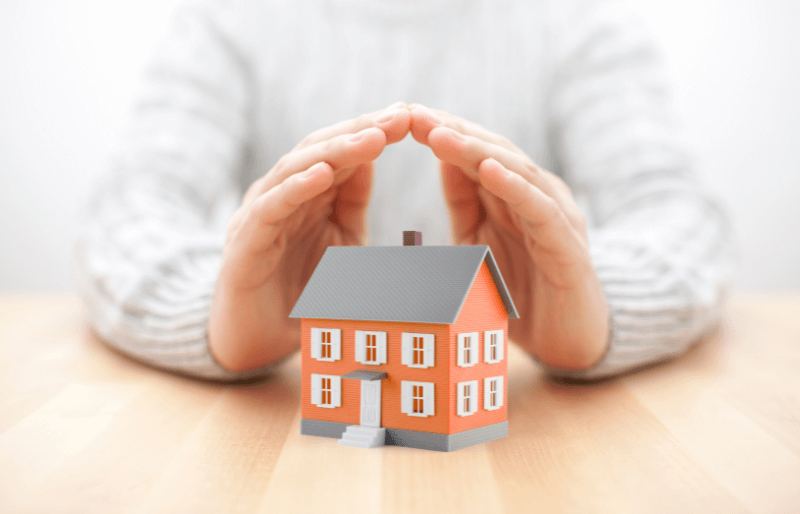
Storm damage can be a daunting hurdle when it comes to selling your home. The fear of lowball offers, extensive repairs, and complicated insurance claims might make you hesitant to enter the real estate market. However, with the right strategy and expert guidance, selling a house with storm damage doesn’t have to be a dealbreaker. This comprehensive guide aims to empower you, the home seller, with actionable tips and practical ways to navigate repairs and increase your home’s market value. We will help you turn the situation in your favor so you can confidently sell your storm-damaged home at a competitive price, without it feeling like an uphill battle. Your journey to selling your home starts here.
What To Do After Storm Damage
After a natural disaster strikes (hurricanes, tornadoes, strong winds), leaving flood and water damage in its wake, it’s crucial to act wisely. Your immediate focus should be on safety, avoiding electrical hazards, and attending to urgent repairs to prevent further harm to your property. After ensuring safety, document the damage extensively—take photographs, and videos, as well as prepare a detailed list of damaged items. This evidence is critical when filing for insurance claims.
Contact your insurance company as soon as possible. Typically, insurance companies process claims on a first-come, first-served basis, so prompt action is essential. Make sure to give them a thorough account of the incident and the damage incurred. A claims adjuster will be sent to assess the extent of the damage. After the home inspection, you will then get an inspection report noting the necessary repairs.
Hiring a professional contractor for a thorough assessment and repair estimate is a wise step. They can help you understand the extent of repairs required and provide a quote, giving you a realistic idea of the expense involved. Remember: Don’t rush into repairs before the insurance company’s assessment, but do take necessary temporary measures to prevent further damage.
Lastly, be proactive and patient. Dealing with storm damage is a time-consuming process, but with patience and the right professionals by your side, your home will be ready for the market.
Should You Repair All Storm Damage To Your House
Whether you should repair all storm damage to your house largely depends on the depth of damage, the cost of repairs, and your financial capacity. However, repairing all damage before listing your home for sale often contributes to a higher selling price and a quicker sale. A fully repaired house offers a clean slate to potential buyers and eliminates their worry about hidden repair costs. It’s important, though, to prioritize repairs based on their impact on the home’s structural integrity and aesthetic appeal. Tackling major issues like roof leaks, broken windows, and water damage first is crucial, as these can significantly affect the home’s value and safety. On the other hand, minor repairs like fixing paint scratches or replacing broken light fixtures can be negotiated with potential buyers. Remember, every homeowner’s situation is unique, so it’s essential to consult with professionals and make informed decisions that suit your circumstances.
Selling Your Home As-Is: An Alternative Path
If dealing with the hassle of repairs and renovations becomes overwhelming, selling your home as-is may be a viable option. This route allows you to list your home in its current state, bypassing the cleanup and repair process. This method can expedite the selling process, as you’re absolved of the responsibility to fix any existing damages before the sale.
However, it’s important to understand that selling a home as-is typically attracts buyers looking for a bargain. They’re often prepared to take on a fixer-upper in return for a lower purchase price. Hence, your selling price may not be as high as it would be if you had undertaken the necessary renovations. For some homeowners selling to cash home buyers in Bartlett helps them avoid the hassle of repairs. These investors specialize in buying storm-damaged properties and are willing to take on the burden of repairs.
In the end, deciding whether to sell a house as-is or take the time to fix storm damage depends on your circumstances, such as your financial capacity, time constraints, and your willingness to undertake the effort of repairs. Consult with an experienced real estate professional to help you weigh your options and make an informed decision that best fits your situation.
Does A Natural Disaster Affect Property Value?
Natural disasters, such as hurricanes and wildfires, particularly in disaster-prone states like Florida and California, can have a significant impact on your property’s value and, consequently, the asking price. After a disaster, it’s common for properties, especially those with visible damage, to experience a decline in value. This decrease is largely due to potential buyers perceiving the home as a high-risk investment.
Furthermore, the area’s reputation can also be affected if it is known for frequent storms, which might deter prospective buyers. If the neighborhood has been severely damaged, even if your home is relatively unscathed, it may still suffer from a lower market value due to the general perception of the area as high-risk.
However, while a disaster can initially lower property values, it does not necessarily mean that the value will remain low. Over time, as the community recovers and rebuilds, property values often bounce back. In some cases, they can even increase due to new infrastructure and renovations.
Therefore, if a storm hits, it’s important not to panic. Take the time to assess the damage and consider your options. While a natural disaster can initially affect your home’s value and sale price, strategic planning and smart repairs can help you navigate the situation and ensure you receive the best possible price for your home.
Is Storm Damage Covered By House Insurance?
One of the most common concerns homeowners have after a storm is whether their insurance policy will cover the damage. In most cases, standard homeowner’s insurance policies do provide coverage for damages caused by storms. This includes damage from wind, rain, and hail. However, it’s crucial to note that flood damage, which is often a byproduct of storms, is typically not covered under a standard homeowner’s insurance policy.
For flood protection, homeowners may need to purchase additional flood insurance. This is particularly important if your home is located in a high-risk flood zone. Furthermore, it’s essential to understand the details of your insurance policy, including what is covered, what the limits are, and what your responsibilities are, such as reporting damage promptly.
Always remember, different insurance companies, and different policies within those companies, can have different rules and coverages. If you’re unsure about your coverage, it’s best to consult with your insurance agent or a professional in the industry. The important thing is that you understand your coverage before a disaster strikes, so you can confidently navigate the aftermath and focus on getting top dollar for your home.

Should You Take Your Home Off The Market After A Natural Disaster
Deciding whether to take your home off the market following a natural disaster largely depends on the extent of the damage and the local market conditions at the time. If the damage is minimal and can be quickly repaired, you may choose to keep your home listed, making potential buyers aware of the situation and any ongoing repairs. Some home buyers, particularly real estate investors, might even see the situation as an opportunity and be open to purchasing ‘as is’ at a discounted price.
On the other hand, if the damage is significant and would take a considerable amount of time and effort to repair, you may consider pulling your home off the market temporarily. This allows you to focus on repairs and renovations without the added pressure of showings and negotiations. Once the repairs are complete, you can relist your property, possibly at a higher price point due to the improvements made.
Additionally, you may also consider reaching out to ‘we buy houses’ companies. These real estate experts often buy properties in any condition and can make a cash offer with no obligation. This can be a win-win situation, particularly if you need to sell your house fast and don’t have the time or resources to manage extensive repairs. They are also not real estate agents, so you won’t have to pay expensive realtor commissions.
Regardless of the route you choose, transparency is key. Be upfront about any severe damage and the steps you’re taking to rectify it. An honest approach not only builds trust but could also potentially save you from costly legal issues down the line.
Conclusion
In conclusion, selling a storm-damaged house might seem daunting, but it certainly doesn’t have to be a dealbreaker. The key is to assess the extent of the damage, consider your options, and make an informed decision that aligns with your needs and market conditions. Whether you decide to undertake repairs and renovations, negotiate with cash buyers, or engage with ‘we buy houses’ companies, transparency remains paramount. By being upfront about the situation and proactive in resolving issues, you can successfully navigate the home selling process, minimize closing costs, and secure a beneficial deal even with storm-damaged properties. Remember, every storm leads to a rainbow, and with the right strategy, you can triumph over adversity and sell your home confidently and effectively.
If you need to sell your house for cash, we can help! We’re ‘Fair Cash Deal’. We’re cash home buyers in Memphis and we specialize in helping homeowners like you sell your house fast, with no hassle, and for a fair price. So reach out to us today and let us help you turn your storm-damaged property into a stress-free sale! So don’t let the fear of storm damage deter you from selling your home.
